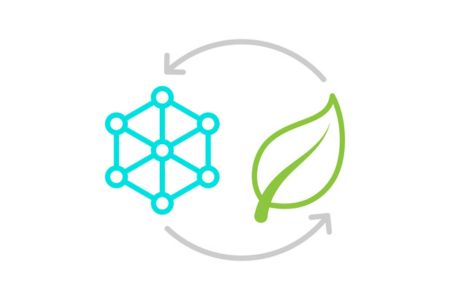
As climate change continues, the growing awareness and importance of preserving our planet drives a higher demand for sustainable alternatives to traditional plastics. Two of these viable biopolymer alternatives are PLA and PHA.
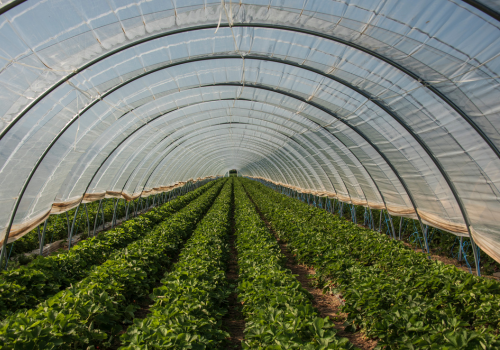
In this article, we explore the topic of plastics orientation and, more specifically, how this orientation leads to the enhancement of a plastic film's mechanical properties.
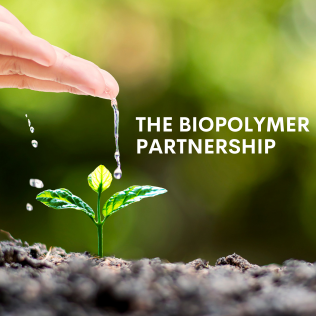
YOU make efforts in developing sustainable biopolymer resources, WE provide the facility to make it happen.
We hope to preserve our ecosystem, and we believe this begins with you.
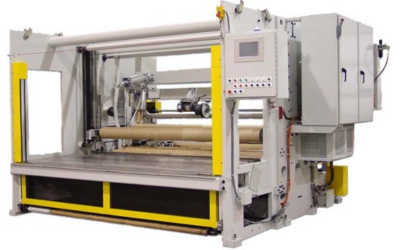
It is important for manufacturers to select the correct surface winding equipment for their operating process in the nonwovens industry. There are many key considerations decision-makers should keep in mind when choosing this machinery, which are explored in depth throughout this article.

The concept of the circular economy has been put into action more and more often in recent years, as people are advocating for waste elimination to lead to a sustainable future. Read more to learn about what the circular economy involves and how it pertains to operations in the Film and Sheet markets.
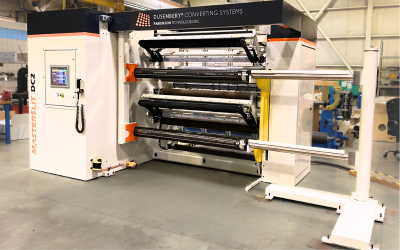
Choosing which slitter rewinder to purchase for your business is a critical decision that impacts every other part of your production line as well as overall profitability. When making this decision, there are certain considerations to take into account which cannot be overlooked.
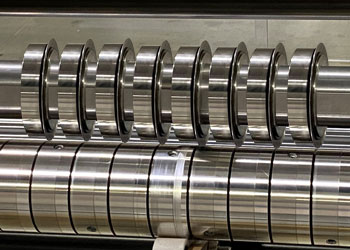
In the world of slitter rewinders, achieving a tight slit width tolerance is essential to the operating process for many applications. The main method of accomplishing this tight tolerance is through the wrap shear slitting process, specifically by utilizing the contact arc wrap slitting technique.
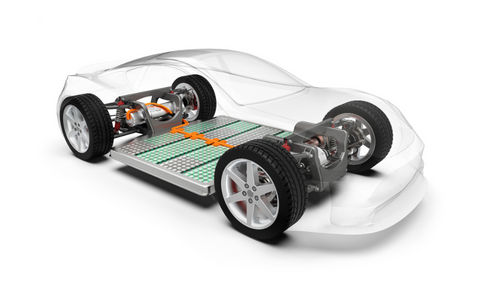
The microporous polymer film used in rechargeable batteries creates a barrier between the anode and cathode so that the electrical charge can still flow without the dangers of short circuits, thermal malfunctions, or battery degradation. This is why the biax orientation process which produces this strong polymer film is an irreplaceable system in the manufacturing cycle of rechargeable lithium ion batteries.
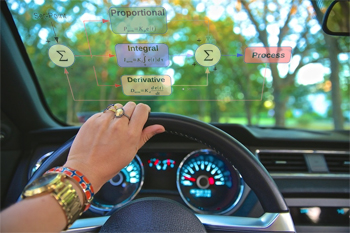
Many of us in the extrusion industry have heard of PID control loops, but do we fully understand the causes and effects PID control loops can have on the extrusion operation?
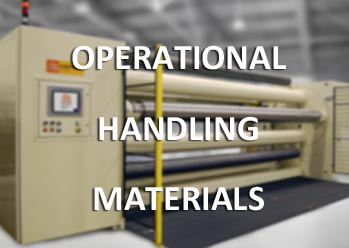
You’ve chosen a manufacturer for your new web handling equipment, and you’re eager to get started with the process. But, before you move forward, there’s one important part of the project that cannot be overlooked: communicating exactly how your machine will be used, and your expectations of its performance.
There are three types of specifications your machine builder must know before they can accurately build a custom-engineered or even a standard machine:
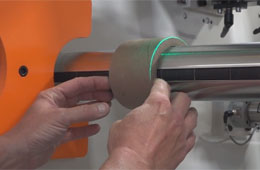
Modern slitter rewinders have come a long way since the early days of converting. Though they perform the same function, the options offered in today’s slitter rewinders make operating these machines easier and faster. These options solve problems that have frustrated operators and assist in producing top quality finished rolls.

Conducting Trials at a Cast Film Biaxial Orientating Laboratory to Achieve Desired Properties for Sustainable Plastics - Research and development teams continue to work on viable alternatives to commodity polymers and rely on research facilities to test their blends.
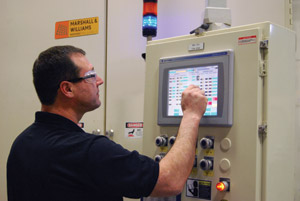
In the first installment of this article, we reviewed how the material cost savings realized by running trials on a pilot scale line vs. production line can more than offset the expense of using an external facility like our Biax Lab. Beyond that, however, conducting trials on a dedicated external pilot line can provide additional advantages that improve the chances of successfully running an R&D project to completion.
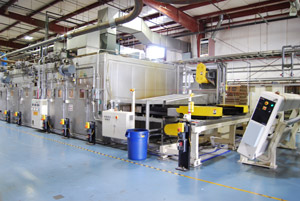
In the development cycle for new film and sheet products, there comes a point where production processes need to be explored, samples need to be manufactured for properties testing and market development, and refinements in formulation need to be perfected. Researchers typically have one of two choices to accomplish this; schedule time on a production asset to run the experiments or run on a dedicated pilot line, whether company owned or independent.

Every “failure” is a learning process that breeds smarter decisions going forward.
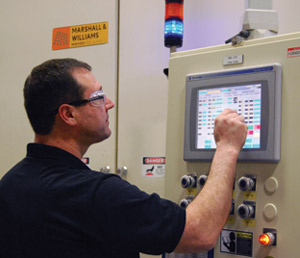
At its main facility in Woonsocket, Rhode Island, Parkinson Technologies maintains a versatile pilot line with extrusion-casting & orientation capabilities, which we refer to as the pilot lab (also known as the BIAX Lab). If you've never done a trial in our lab before, there are a few things you should know in order to be prepared for a successful run.
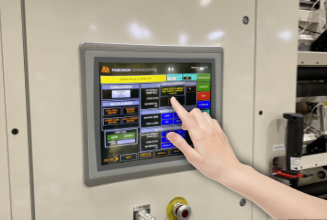
When assessing the performance of web processing machinery, users often consider the overall throughput, quality of the final product, and its safety features. These considerations are essential, but it’s important not to overlook one of the most important features of a well-engineered machine, the user interface (UI).
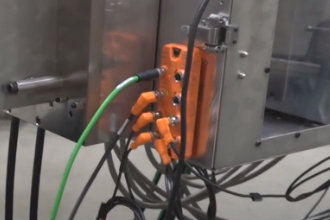
IO-Link smart sensor technology has received a great deal of attention recently and for good reasons. This technology has found its way into many industrial applications due to its advantages over standard binary and analog interfaces. IO-Link smart sensors are a much more intelligent communication technology that not only transfers measured values and switching signals but can also store parameters, deliver signal quality, and device status.
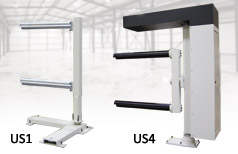
Slitter rewinders have one goal: to achieve high-quality finished rolls as quickly and as safely as possible. No matter what the material is, every facility wants to achieve the optimum output level without sacrificing the finished product quality. An adequate roll handling system is needed to achieve the desired level of productivity and quality.
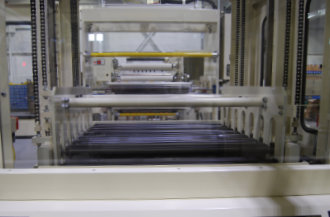
As the name implies, a web accumulator is a machine built for one primary function, to accumulate and temporarily store material fed from or into a continuous process to a machine or operation that must be momentarily stopped or run slower than its processing line speed.

There is no denying that 2020 was a challenging year for many of us, and the transition into 2021 will also hold some challenges. However, like your company, we remain resilient and will continue to move forward. Creating value-added content in blog articles is one way we’ve been able to stay connected with you.
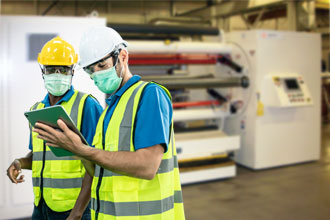
Manufacturers of industrial safety devices and machinery control systems are continually developing new products in response to the updated safety requirements. They can be excellent resources for which devices or systems to consider and ways to apply them to ensure that your equipment meets today’s safety standards. For it is way better to be safe ― by working with the latest guidelines, understanding the risk assessment process, and putting the necessary risk reduction measures in place than to be sorry.
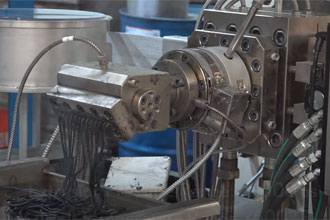
Conducting trials of your material in our filtration lab line is a great way to gather insight into how your application will perform when filtering contaminated thermoplastics through the KCH continuous belt screen changer.
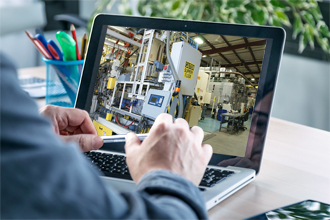
Nothing can substitute for being side-by-side with a technician during a trial. The ability to observe the process in person, analyze data, discuss the recommendations, and make process adjustments in real-time are the true benefits of conducting trials at our technology labs. However, for those unable to make the journey to Woonsocket, RI, there are viable alternatives.
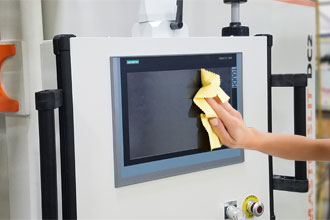
Choosing the wrong method of cleaning a touchscreen monitor can leave that monitor unusable. When a touchscreen HMI is used to control machinery, this could have the dire consequence of leaving the entire machine inoperable.
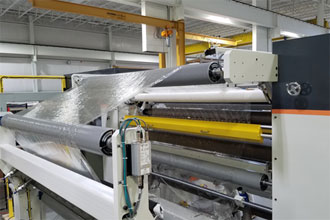
At its core, a slitter rewinder has one primary function, to unwind a mill roll and convert it into multiple smaller rolls. This function may sound straight forward, but these machines can be anything but simple. They are typically engineered to handle a wide variety of materials, each with their processing requirements. There is a lot to consider when choosing the best options for an application. One of those options is choosing the best web entry path from the unwind stand to the slitting and rewinding section.

Just a few short months ago, the world was hit with a microscopic virus that infected millions and affected the global population. Most nonessential businesses have temporarily closed their doors and only recently started the reopening process. For those companies deemed necessary, along with those like Parkinson Technologies who support those vital businesses, we were lucky to continue operations. But it still has been a challenging experience.

There are many options when it comes to your melt filtration system. Investing in the right screen changer for your process can mean the difference between saving time and material, and wasting those resources. This will affect your profits over the life of your extrusion line.
If you’re running a discontinuous screen changer, it might be time to upgrade.
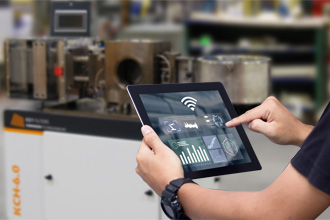
You may have heard of the term “Industry 4.0,” since it’s the hottest buzz word in the world of machine technology. Where Industry 3.0 brought us the computing age, Industry 4.0 brings us the next step in technology with automation and data exchange across numerous platforms. In this blog, I’m going to explain the benefits of incorporating the Industry 4.0 technology into your extrusion system.

One of the challenges that continually plagues the custom capital equipment purchasing process is difficulty in establishing accurate specifications for a given piece of process machinery as potential projects move from the initial inquiry to an order, and from concept to reality. Stakeholders are looking for ways to mitigate risk by covering all the bases.
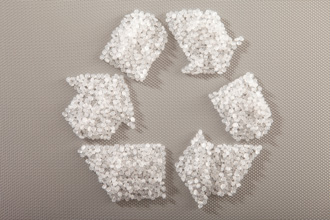
Parkinson Technologies is committed to participating in the plastics sustainability vision by engineering extrusion filtration solutions that enable greater recycled material usage.
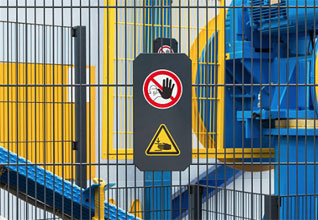
As an OEM of industrial machinery for a wide variety of plastics processing, web handling, and slitting applications, we are often put in a difficult position of responding to requests from customers for upgrades to legacy machines while navigating a minefield of product liability concerns. This can be frustrating for customers who view the scope of their request as being a “simple” or “minor” upgrade or modification, whereas from the OEM’s viewpoint, the scope of the project, once fully assessed, typically becomes much broader. When a customer then receives a proposal with costs well beyond what they deem reasonable for the scope of work they are envisioning or are surprised by a refusal from the OEM to even provide a proposal, it can lead to the misperception of the OEM not wanting to work with a customer. Most of the time, that simply isn’t the case.

That slitter rewinder you bought 40 years ago has been pretty good to you overall. But more recently there have been warning signs: glitches, worn-out parts needing replacement, and performance that’s not quite measuring up. If this scenario sounds familiar, it may be time for an upgrade.
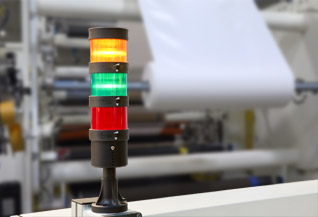
As a manufacturer of machinery for the plastics industry, one of our main concerns when designing, engineering, and building these machines is to always keep safety in mind. Operating machinery can always carry the risk of injury. Workers can be struck by moving parts, trapped between rollers, belts, and pulleys, and cut or punctured by sharp edges. That’s why safety standardization efforts are developed to define, for example, the type of guarding, fencing, or torque limitation.

In a previous preventive maintenance article, we discussed back-up batteries and how replacing them will save time and money, and ultimately a lot of headache. However, the battery isn’t the only part of a machine that can be overlooked. Here is a list of other items that should be inspected.
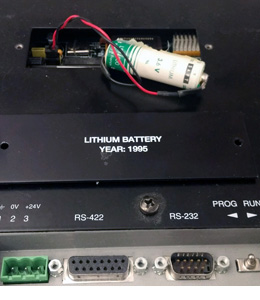
Your workhorse machine has given you decades of service due to your diligent maintenance practices and emphasis on safe and careful operation over the years. Overlooking one small and easily missed reminder can stop you dead in your tracks and result in costly downtime and service visits. This inexpensive component (usually less than $20.00) can save your organization a lot of grief if it is an included item in your preventive maintenance regimen.
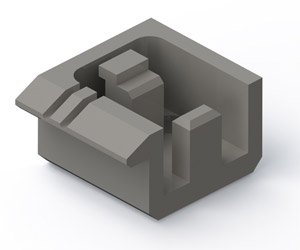
Although it may sound futuristic, 3D printing is here—and it’s here to stay. 3D printing has steadily impacted how manufacturers do business, and Parkinson Technologies is no exception. There are two ways Parkinson uses 3D printing: for prototyping and for creating small functional components for our machinery. Learn more about the real-world examples Parkinson Technologies utilizes this 3D printing technology.
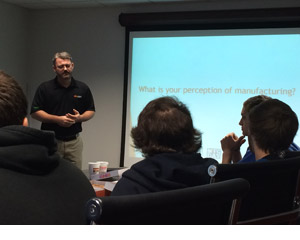
At Parkinson Technologies, we believe the key to inspiring fresh interest in manufacturing careers is education. We’re doing our part to let younger generations know that manufacturing is about more than pulling levers on an assembly line.